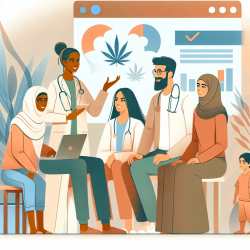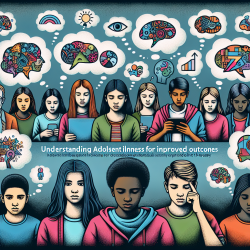Empowering Conversations: Reducing Stigma in Cannabis Use Disclosure
As healthcare providers, our goal is to create an environment where patients feel comfortable disclosing all aspects of their health, including cannabis use. Recent research, such as the study titled "The role of stigma in cannabis use disclosure: an exploratory study," highlights the significant impact stigma has on patients' willingness to discuss their cannabis use with healthcare providers. Understanding and addressing this stigma is crucial for providing comprehensive and informed care.
Understanding Stigma and Its Impact
The study identified four primary domains of stigma: perceived, anticipated, enacted, and internalized. Each of these domains plays a role in how patients perceive and experience stigma related to their cannabis use:
- Perceived Stigma: Patients' awareness of negative societal attitudes towards cannabis users.
- Anticipated Stigma: Patients' expectations of being treated differently by healthcare providers due to their cannabis use.
- Enacted Stigma: Actual experiences of discrimination or devaluation by healthcare providers.
- Internalized Stigma: Patients' acceptance of negative stereotypes about cannabis users, affecting their self-worth.
The study found that anticipated stigma had the most significant impact on nondisclosure of cannabis use. Patients often worry that their healthcare providers will treat them differently, not listen to their concerns, or look down on them if they disclose their cannabis use.
Strategies for Reducing Stigma
To improve patient outcomes and foster open communication, healthcare providers can implement several strategies to reduce stigma:
1. Educate Yourself and Your Team
Understanding the benefits and risks of cannabis use is essential. Providers should be knowledgeable about the human endocannabinoid system, the pharmacokinetics and pharmacodynamics of cannabis, and potential drug interactions. This knowledge will help providers engage in informed and unbiased conversations with their patients.
2. Create a Nonjudgmental Environment
Patients are more likely to disclose their cannabis use if they feel their healthcare provider is nonjudgmental and open to discussing all aspects of their health. Providers should actively work to create a safe and supportive environment where patients feel comfortable sharing their cannabis use history.
3. Normalize Cannabis Use Discussions
Integrate routine screening for cannabis use into your practice. By regularly asking about cannabis use in a nonjudgmental manner, providers can normalize these discussions and reduce the stigma associated with cannabis use.
4. Address Anticipated Stigma Directly
Providers should acknowledge the potential for anticipated stigma and reassure patients that their cannabis use will not affect the quality of care they receive. This can help alleviate patients' fears and encourage more open communication.
Encouraging Further Research
While the study provides valuable insights into the role of stigma in cannabis use disclosure, further research is needed to explore anticipated stigma more deeply and develop effective interventions. Healthcare providers are encouraged to stay informed about ongoing research and contribute to the growing body of knowledge on this topic.
By implementing these strategies and fostering open, nonjudgmental conversations, healthcare providers can help reduce the stigma associated with cannabis use and improve patient outcomes.
To read the original research paper, please follow this link: The role of stigma in cannabis use disclosure: an exploratory study.










